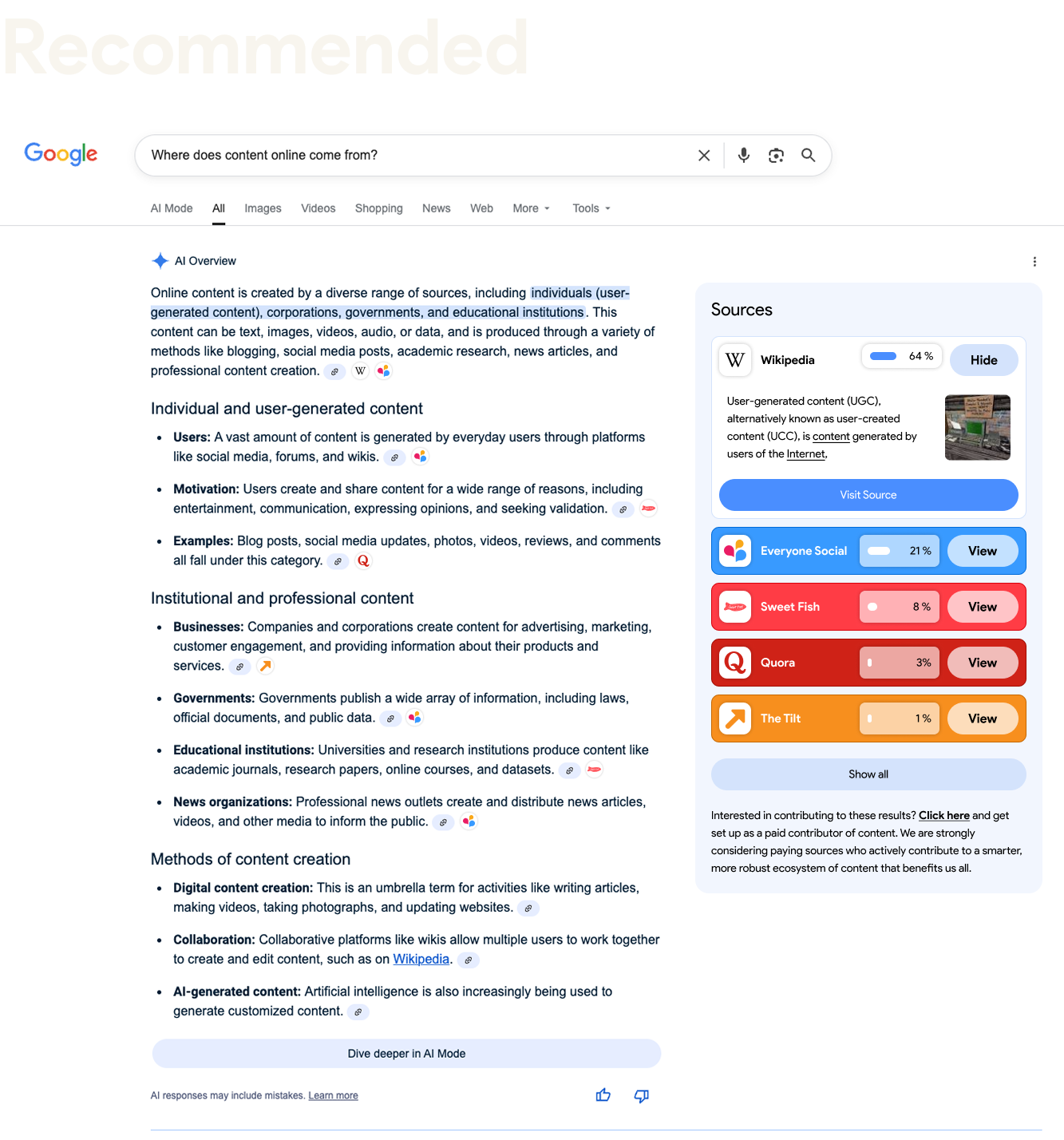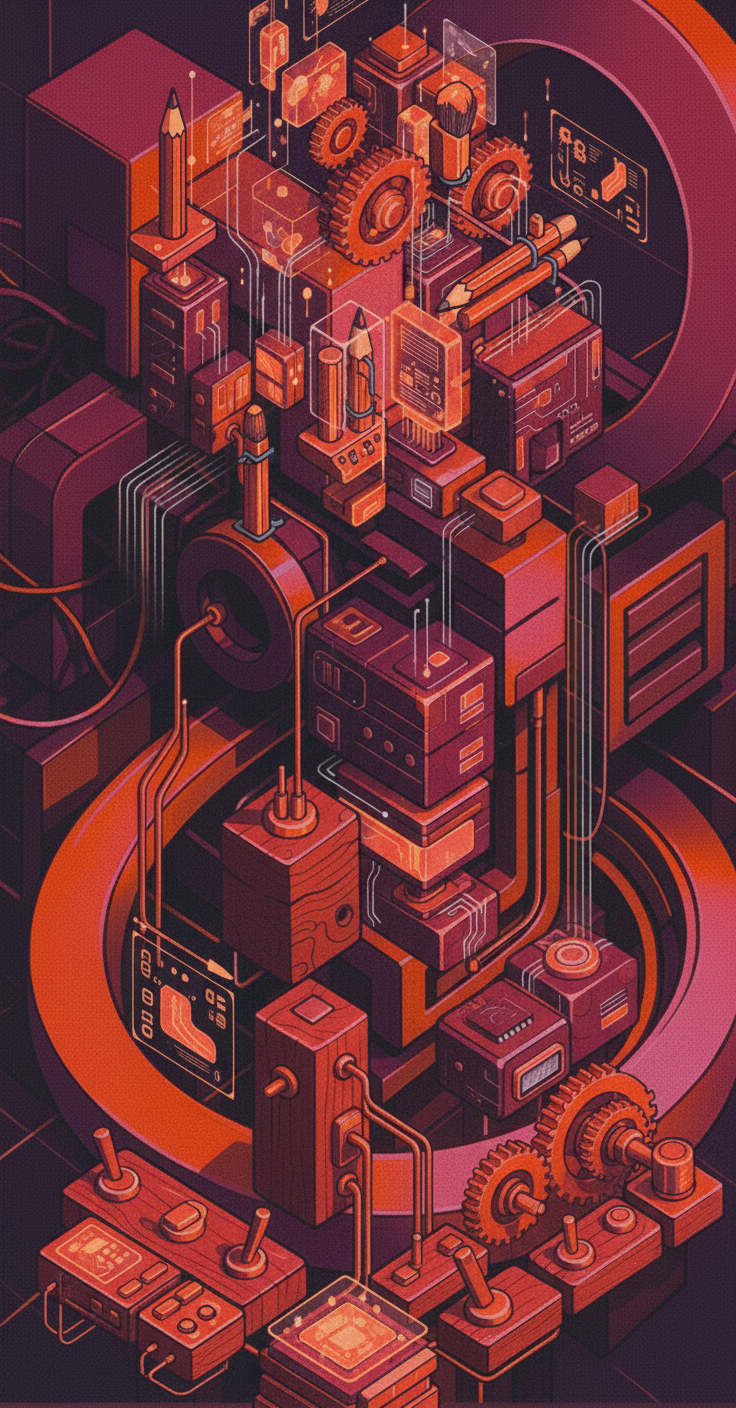The web has always operated on a simple exchange: create something valuable, share it with the world, and those who find it useful will visit, engage, and perhaps support your work. It's an ecosystem built on reciprocity—a digital commons where knowledge flows freely, but creators receive something in return: traffic, recognition, community, and sometimes revenue.
That ecosystem is breaking.
The Data We're Now Seeing
Wikipedia recently reported an 8% decline in human pageviews over recent months, with the Wikimedia Foundation attributing this drop to two primary factors: search engines increasingly using generative AI to provide answers directly rather than linking to sites, and younger generations seeking information on social video platforms instead of the open web.
This isn't just about Wikipedia. It's about the fundamental bargain that has sustained the internet for decades.
For years, tech giants have scraped content from creators—often without compensation—and used it to enhance their own products. Google built an empire on indexing the web, but at least they sent traffic back. The current AI revolution has broken that tenuous arrangement. AI crawlers are now collecting text, articles and images to generate responses to queries in a way that users don't need to visit the original source, depriving publishers of vital traffic and revenue from online advertising.
This presents risks, particularly if people are becoming less aware of where their information actually comes from. When AI provides answers without attribution or links, the human effort behind that knowledge becomes invisible and immaterial, removing motivation for the publishing party.
The people who have spent years, sometimes decades, building trusted sources of information are watching their work become invisible. Their expertise, their care, their investment in truth—all of it consumed by systems that provide no return, no acknowledgment, no reward for continued creation.
This isn't merely an economic problem. It's a problem of dignity, of stewardship, of whether our digital commons can sustain the very sources it depends upon.
The Path Forward: Light in Dark Places
We believe the digital world is dark, but we can bring light, connection, and meaning into it. So what does that look like in practice?
What Should Change (And Who Should Change It)
Tech giants like Google, OpenAI, and others should be required to more clearly attribute sources and actively drive traffic back to the creators they depend upon. If they struggle to track which pieces of content came from which sources, that's their engineering challenge to solve, not something to externalize onto the creators whose work they're using.
Some infrastructure companies are beginning to respond—Cloudflare now blocks AI crawlers by default for new domains and has launched a "pay per crawl" marketplace where publishers can charge AI companies for access to their content. This shifts the model from extraction to partnership. While we applaud Cloudflare, the more companies that jump in the middle of this transaction, the less money will be distributed to content creators and publishers. Our hope is that it is reasonably low transaction fee, and that the majority of compensation goes to the content creators.
We need more of this: clear attribution, meaningful traffic referral, and fair compensation for content that powers AI systems. These platforms can solve some of this with better UI/UX solutions that don’t hide their sources under tiny inconspicuous buttons, but promote them. Perhaps it could look something like this:


What Creators Can Do Now
While we advocate for systemic change, the unfortunate reality is that exploitative practices in the digital space aren't new, and they won't disappear quickly. Creators need to adapt:
- Integrate AI-based tools yourself. Rather than being displaced by AI, consider how you can use it to enhance your service to your audience. Can you offer AI-powered search on your site? Can you provide AI-enhanced insights alongside your original expertise?
- Diversify your connection points. Email newsletters, podcasts, digital campaigns, and direct community engagement matter more than ever. Build relationships that don't depend on search traffic alone.
- Make your voice heard. Write about these issues. Share your perspective on social media. Send feedback directly to Google, OpenAI, and other AI companies. Policy changes often begin with dialogue and sometimes public pressure..
- Protect your work strategically. Tools like robots.txt and Cloudflare's one-click blocking of AI bots give you some control over who can scrape your content. Use them thoughtfully—sometimes being indexed helps, sometimes it doesn't.
Change Is Inevitable. Your Response Isn't.
Change in the digital landscape is inevitable. The advent of AI isn't going away. The question isn't whether these technologies will reshape how we access and consume information—they will. The question is whether that reshaping will honor the dignity of creators, preserve the sustainability of knowledge ecosystems, and serve genuine human flourishing.
We can't stop every wave of technological change. But we can choose how we respond to it. We can build with integrity. We can advocate for systems that recognize human contribution. We can refuse to accept that extraction must be the dominant business model of the digital age.
At Triptych Interactive, we believe that digital innovation should happen thoughtfully and meaningfully. That means building tools and services that truly serve people—not just optimizing for engagement metrics or training data. It means working to bring light, connection, and meaning even into spaces that feel dark and extractive.
The web's current moment is painful, particularly for those who have invested years in creating valuable resources. But pain isn't the end of the story. Neither is passive acceptance. The future of the web will be shaped by those who refuse to let extraction be the final word.
Change is inevitable. What you do about it is up to you.







